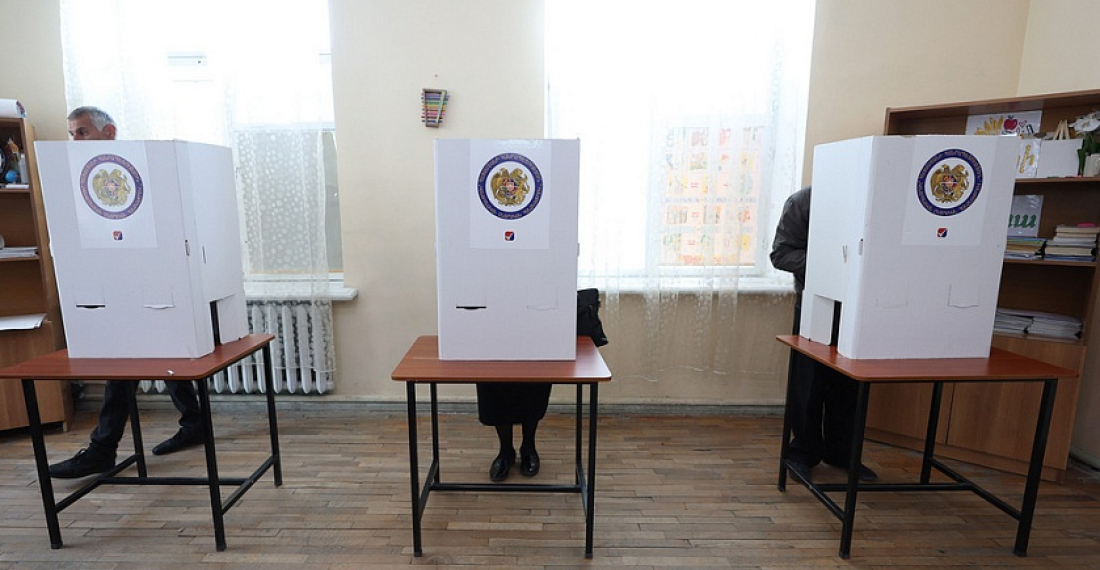With just over a year left before parliamentary elections in Armenia, Prime Minister Nikol Pashinyan finds himself grappling with a rapidly changing political landscape. At the end of last month, voters in the country’s second largest city of Gyumri went to the polls to elect a new municipal council that would then select a mayor. While local elections might not seem as important as national votes, the results were anything but insignificant. With Pashinyan’s approval ratings around 11 percent according to a survey conducted in January, the results and how the vote was conducted could prove a useful barometer to assess his political future.
The outcome from Gyumri shows a deeply fragmented electorate, making it difficult for Pashinyan’s Civil Contract to ensure victory elsewhere. This was the same in the municipal vote held in the capital, Yerevan, in September 2023. Then, in order to secure the backing of the council to select the mayor, Civil Contract had to gain the backing of a controversial political party with sufficient votes to push governmental candidate Tigran Avinyan into the seat. In the more recent Gyumri election, the same was necessary. However, in this case, Civil Contract’s Sarik Minasyan did not have that support and Pashinyan’s candidate effectively lost.
Though Minasyan attracted 36.21 percent of vote, technically the largest, his closest rival, controversial former mayor Vartan Ghukasyan, received 20.5. Other opposition parties attracted the remainder. In a country where political allegiances run deep and tensions between opposition factions can be high, their combined support for Ghukasyan, whose term in Gyumri from 1999 to 2012 was mired in allegations of corruption and even shootouts involving family members, was not a given. However, as the remnants of previous regimes, late last week they all did. Notably, the new EU Alliance believed close to Pashinyan failed to pass the electoral threshold.
This leaves Gyumri, home to the Russian 102nd Military Base, governed by a Communist Party mayor at a time when Pashinyan is attempting to pivot his foreign policy towards the West. Vital to this will be opening the closed border with Turkiye. This includes not only the Margara crossing close to Yerevan, but also the Kars–Gyumri railway that passes through Akhuryan just outside the city. Ghukasyan, however, is openly pro-Russian and anti-Turkish. He also opposes the normalisation of relations with Baku as well as Ankara.
Although it is just as likely that in-fighting among an opposition dominated city council could see it eventually collapse, it also raises the prospect that Pashinyan might not be able to win an outright majority in the upcoming parliamentary elections scheduled for next year. The opposition have already declared that Gyumri is a clear sign that he will struggle to maintain power past that. This is all the more significant given that Pashinyan embarked on his literal march to power in 2018 from Gyumri seven years earlier almost to the day.
Incidentally, local elections were also held just outside of Yerevan in Parakar where the opposition Country of Living, believed close to Russian-Armenian businessman Ruben Vardanyan, now on trial in Baku, scored a convincing win there too. Pashinyan has downplayed the significance of these setbacks, instead framing them as a victory for democracy, but the reality is that the stakes have never been higher.
Armenia is at a political crossroads, and Pashinyan’s ability to navigate it will be key to his survival. This also includes whether he can successfully hold a referendum on a new constitution that will likely remove one of the remaining hurdles to signing a peace deal with Azerbaijan. He would also need to remain in power to see it through, probably by counting on support from the European Union and United States. In recent months, especially after the return of US President Donald Trump to the White House, increasing uncertainty is exasperated by the possibility that Russia could return to the region if it is no longer as occupied by its war in Ukraine.
As previous governments before him, Pashinyan also appears to prioritise normalising relations with Turkiye over Azerbaijan. Being seen to change the constitution at the behest of Baku is something that he is eager to avoid. For now, however, the normalisation of relations with Ankara remains linked to Baku although perceived claims to parts of Turkiye could also anyway emerge as an obstacle to the process later down the line. There is now just a year left before the parliamentary elections and the completion of a new constitutional draft.
While it remains possible that his trademark populism and an often impotent opposition, especially if it fails to unite, could prove sufficient for his electoral chances, it is more likely that he will need to offer something beneficial to voters. That could be normalising relations with Azerbaijan and Turkiye, improving relations with the West while not antagonising Russia, and presenting his Real Armenia as a new beginning, breaking regional semi-isolation, economic failure, excessive foreign dependency, and military defeat. Long gone are the days of the Velvet Revolution. Now it is the loss of Karabakh that defines his administration.
All the while, Russia lingers on the periphery almost as if it is biding its time. Unlike last year, when Pashinyan declined an invitation to attend Victory Day celebrations in Moscow, he has already agreed to do so next month. It is believed that Azerbaijani President Ilham Aliyev will also be present.







